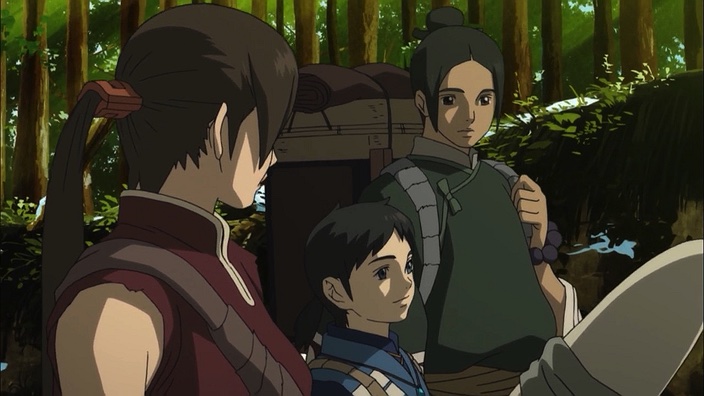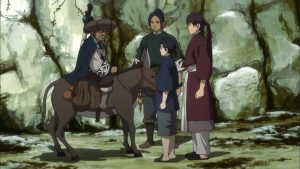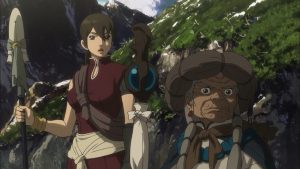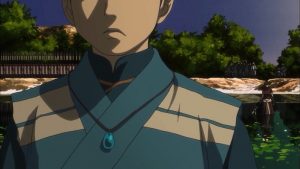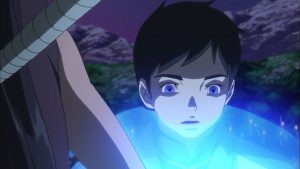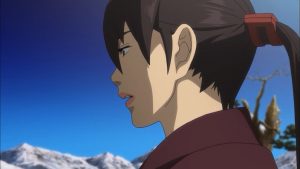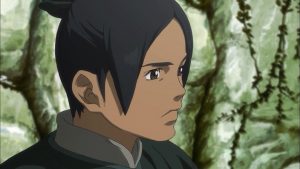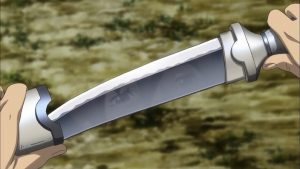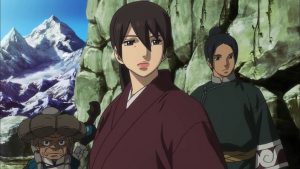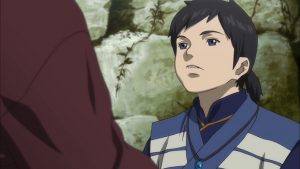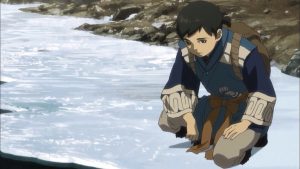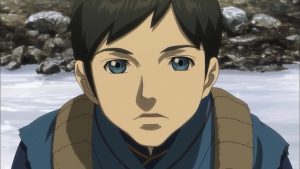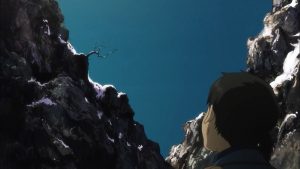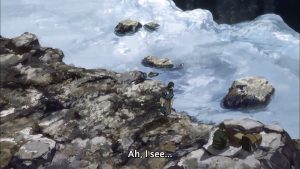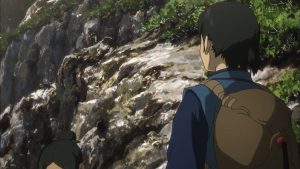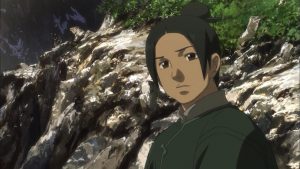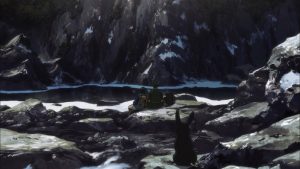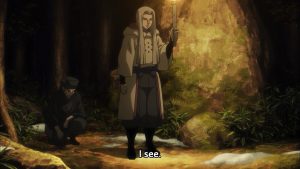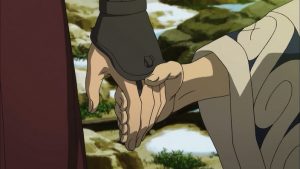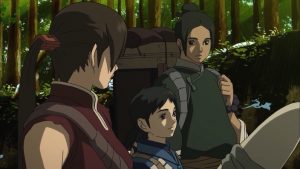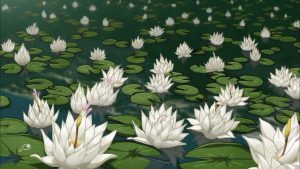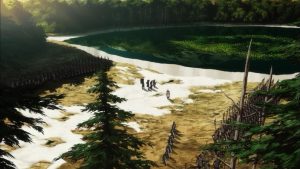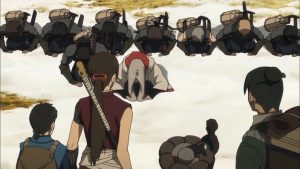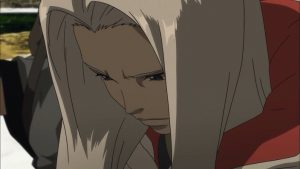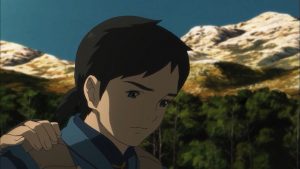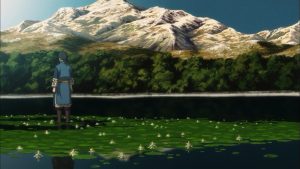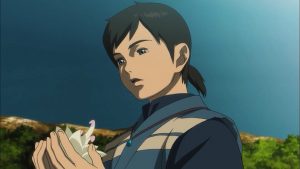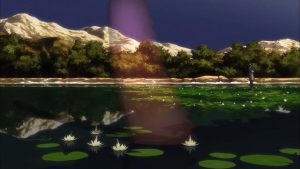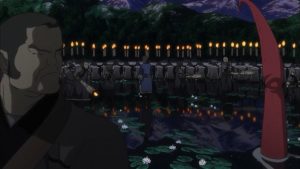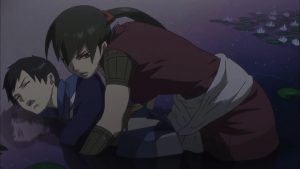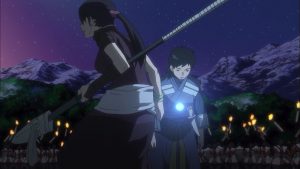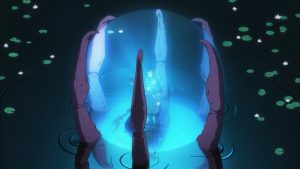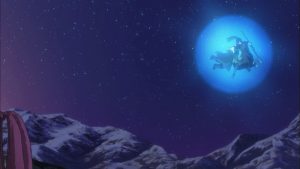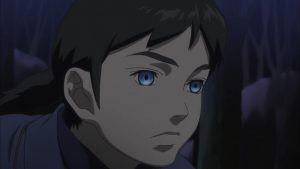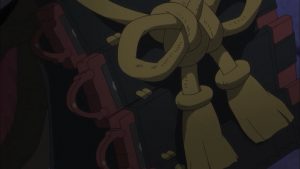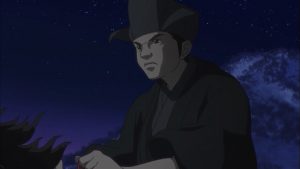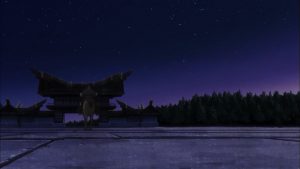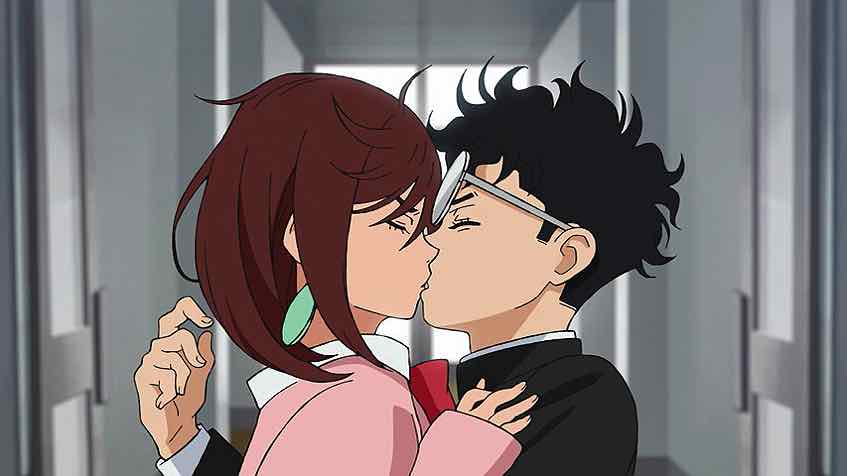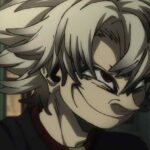 More of the same from me, really. I can honestly say that there’s never been an anime that made me care about – and for – its characters as much as Seirei no Moribito. For all the other reasons why it ranks as my favorite series of all-time, that’s probably the most important. When stuff happens like what happens in this episode, the emotions are so powerful that they’re almost too powerful. I have to slow things down for a couple of minutes, take a break. The buildup has been so exquisite that the payoff moments now are like a string of haymakers to the jaw.
More of the same from me, really. I can honestly say that there’s never been an anime that made me care about – and for – its characters as much as Seirei no Moribito. For all the other reasons why it ranks as my favorite series of all-time, that’s probably the most important. When stuff happens like what happens in this episode, the emotions are so powerful that they’re almost too powerful. I have to slow things down for a couple of minutes, take a break. The buildup has been so exquisite that the payoff moments now are like a string of haymakers to the jaw.
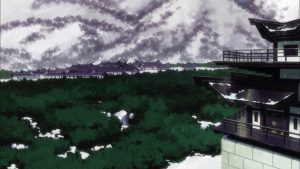 Even now, the Nth time through, knowing what’s coming these next three episodes (spoilers) fills me with melancholy. The plot definitely kicked in this episode, with the now “indispensable to the kingdom” Shuga setting off with his own army to meet Chagum at the Place of Feasting. But it’s the intimate and often dialogue-free character moments in the A-part that define “In Search of the Shigu Salua” for me. They come at the end of what appears to be a short time skip – though of course in the life of a boy of 12, even a short passage of time can mean remarkable change.
Even now, the Nth time through, knowing what’s coming these next three episodes (spoilers) fills me with melancholy. The plot definitely kicked in this episode, with the now “indispensable to the kingdom” Shuga setting off with his own army to meet Chagum at the Place of Feasting. But it’s the intimate and often dialogue-free character moments in the A-part that define “In Search of the Shigu Salua” for me. They come at the end of what appears to be a short time skip – though of course in the life of a boy of 12, even a short passage of time can mean remarkable change.
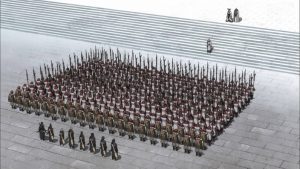 Chagum has indeed grown, and having seen a birthday arrive is symbolic of that. His hair is now in a ponytail, and his leggings have nearly become hanzubon. His senses no doubt sharpened by the water spirit, he notes Mistress Torogai’s return long before even Balsa. Torogai pays him a compliment (that may be a first), noting that Chagum is “starting to look like a man”. She’s also thoughtfully brought him a suit of clothes to fit his size and bearing, and – at Balsa’s request – a short sword. There’s an extremely bittersweet quality to all this – after all, it’s about enabling the boy to meet his destiny with dignity and to defend himself at the last.
Chagum has indeed grown, and having seen a birthday arrive is symbolic of that. His hair is now in a ponytail, and his leggings have nearly become hanzubon. His senses no doubt sharpened by the water spirit, he notes Mistress Torogai’s return long before even Balsa. Torogai pays him a compliment (that may be a first), noting that Chagum is “starting to look like a man”. She’s also thoughtfully brought him a suit of clothes to fit his size and bearing, and – at Balsa’s request – a short sword. There’s an extremely bittersweet quality to all this – after all, it’s about enabling the boy to meet his destiny with dignity and to defend himself at the last.
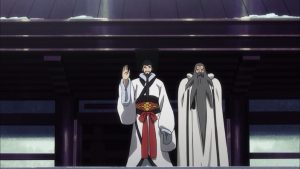 Dignity is something Chagum has in spades, it must be said. Kamiyama Kenji and the animators do a magnificent job of showing us Chagum’s growth over the course of the series, and here specifically, of capturing him poised on the precipice between childhood and adolescence. This applies both to his appearance and the way he’s written. He’s such a beautiful soul – as Balsa and Tanda are too of course, but in Chagum’s case it’s especially heartbreaking to see him wrestle with the fate that’s been handed to him. It’s certainly no wonder that Torogai remarks on the motherly look that’s come to Balsa’s face as she watches her precious child now.
Dignity is something Chagum has in spades, it must be said. Kamiyama Kenji and the animators do a magnificent job of showing us Chagum’s growth over the course of the series, and here specifically, of capturing him poised on the precipice between childhood and adolescence. This applies both to his appearance and the way he’s written. He’s such a beautiful soul – as Balsa and Tanda are too of course, but in Chagum’s case it’s especially heartbreaking to see him wrestle with the fate that’s been handed to him. It’s certainly no wonder that Torogai remarks on the motherly look that’s come to Balsa’s face as she watches her precious child now.
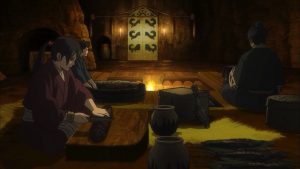 I’ve always wondered, and still do, whether Torogai was being literal when she told Balsa that she’d “raised” three children. I suspect we’re supposed to wonder (she’s a fundamentally mysterious character to begin with). The scenes that follow are honestly almost too much for my heart to bear. Chagum interrogates Tanda as to why he doesn’t just “marry Balsa as soon as he can”, and even offers to propose on his behalf. Tanda (you poor, kind man…) can only pine that his love his mellowed from “the heat of summer sunshine to the warmth of the autumn wind”, and that he and Balsa have known each other too long and drifted apart.
I’ve always wondered, and still do, whether Torogai was being literal when she told Balsa that she’d “raised” three children. I suspect we’re supposed to wonder (she’s a fundamentally mysterious character to begin with). The scenes that follow are honestly almost too much for my heart to bear. Chagum interrogates Tanda as to why he doesn’t just “marry Balsa as soon as he can”, and even offers to propose on his behalf. Tanda (you poor, kind man…) can only pine that his love his mellowed from “the heat of summer sunshine to the warmth of the autumn wind”, and that he and Balsa have known each other too long and drifted apart.
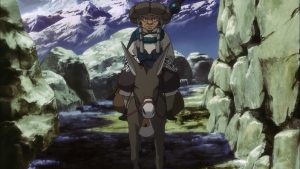 This is so sad for so many reasons. Chagum is doing this to try and fix things for the people he loves, because he fully expects to die. And one suspects that Tanda may be right – certainly that the childlike take Chagum brings to the situation is an impossible dream now. As the quartet reunites and walks along the riverbed towards Chagum’s fate, he takes Balsa and Tanda by the hand and smiles serenely. In doing so he expresses both his gratitude to and love for them and the fact that he’s made peace with whatever happens to him. It’s one of the most emotionally powerful moments anime has ever produced.
This is so sad for so many reasons. Chagum is doing this to try and fix things for the people he loves, because he fully expects to die. And one suspects that Tanda may be right – certainly that the childlike take Chagum brings to the situation is an impossible dream now. As the quartet reunites and walks along the riverbed towards Chagum’s fate, he takes Balsa and Tanda by the hand and smiles serenely. In doing so he expresses both his gratitude to and love for them and the fact that he’s made peace with whatever happens to him. It’s one of the most emotionally powerful moments anime has ever produced.
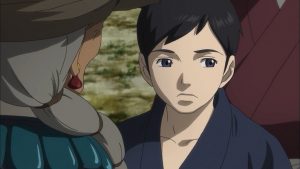 That moment in the main trio’s character arc is so elegiacally beautiful that anything that comes after is bound to be a bit of an anticlimax. In truth, this is where the plot itself comes together. Shuga arrives at the Aoike, presumed to be the Place of Feasting, with his army and the Hunters in tow and a message of conciliation to Balsa. What he neglects to mention is that on the Mikado’s orders he’s positioned three elite archers along the return trail back to Kosenkyo. The Mikado’s treachery is a matter for later, however, as Chagum darts off across (literally) the pond, seemingly drawn to the Shigu Salua flowers (a callback to “Flower Wine For Tanda”). And we get our first look at the La Lunga, which resemble giant crabs as much as anything.
That moment in the main trio’s character arc is so elegiacally beautiful that anything that comes after is bound to be a bit of an anticlimax. In truth, this is where the plot itself comes together. Shuga arrives at the Aoike, presumed to be the Place of Feasting, with his army and the Hunters in tow and a message of conciliation to Balsa. What he neglects to mention is that on the Mikado’s orders he’s positioned three elite archers along the return trail back to Kosenkyo. The Mikado’s treachery is a matter for later, however, as Chagum darts off across (literally) the pond, seemingly drawn to the Shigu Salua flowers (a callback to “Flower Wine For Tanda”). And we get our first look at the La Lunga, which resemble giant crabs as much as anything.
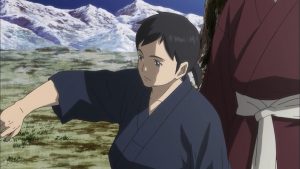 Kamiyama-sensei has masterfully brought us to this point, where both the character and plot climaxes arrive nearly simultaneously. Whatever you love about Seirei no Moribito, this episode has some of it, but we’ve now arrived at the final arc in no uncertain terms. What matters most for the moment is Chagum’s survival, plain and simple – and even with the formidable forces arrayed to try and secure it, that remains a daunting challenge. Complicating matters is that Nagai has realized that Shuga’s information is incorrect – and against the odds he and Balsa are facing, that seems to be a fatal blow.
Kamiyama-sensei has masterfully brought us to this point, where both the character and plot climaxes arrive nearly simultaneously. Whatever you love about Seirei no Moribito, this episode has some of it, but we’ve now arrived at the final arc in no uncertain terms. What matters most for the moment is Chagum’s survival, plain and simple – and even with the formidable forces arrayed to try and secure it, that remains a daunting challenge. Complicating matters is that Nagai has realized that Shuga’s information is incorrect – and against the odds he and Balsa are facing, that seems to be a fatal blow.


